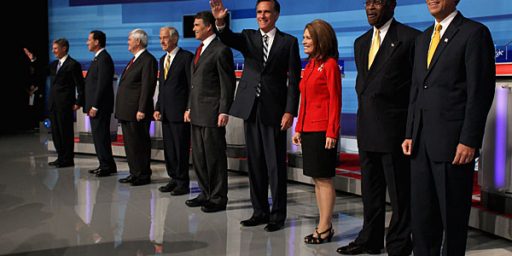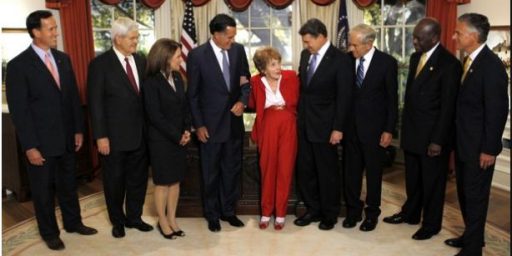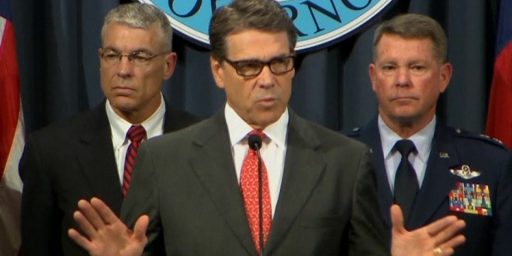Rand Paul, Rick Perry Spar Over Foreign Policy
Rick Perry and Rand Paul are highlighting what looks to be a coming battle inside the GOP over foreign policy.
Nobody has officially declared themselves a candidate for the Republican nomination for President yet, of course, but this weekend two candidates were certainly acting as though that is what they have in mind, and setting up a rivalry that could lead to a very interesting foreign policy debate inside the Republican Party in the process. On one side there’s Texas Governor Rick Perry, who had already spent last week putting himself at the forefront of the news cycle with his strong criticism of the President over the ongoing border crisis and the Central American migrants who have been arriving at the border. On the other side stands Kentucky Senator Rand Paul, who has made a name for himself in no small part by bucking what many consider to be the conservative line on issues ranging from dealing with non-violent drug offenders, and area where he is teaming up with Sen. Cory Booker to propose new legislation, to foreign policy, where he has become perhaps the most public proponent for a foreign policy that is distinctly different from the way the GOP has defined itself going back to the Cold War itself. It is on foreign policy that Perry and Paul have traded barbs that are likely to continue into 2016, especially if both of them run for President as expected.
It started on Saturday when Perry published an Op-Ed in The Washington Post attacking Paul for what he called his “isolationist” views:
As a veteran, and as a governor who has supported Texas National Guard deployments to Iraq and Afghanistan, I can understand the emotions behind isolationism. Many people are tired of war, and the urge to pull back is a natural, human reaction. Unfortunately, we live in a world where isolationist policies would only endanger our national security even further.
That’s why it’s disheartening to hear fellow Republicans, such as Sen. Rand Paul (Ky.), suggest that our nation should ignore what’s happening in Iraq. The main problem with this argument is that it means ignoring the profound threat that the group now calling itself the Islamic State poses to the United States and the world.
In the Islamic State, which came to prominence in Syria and now controls ample territory, weapons and cash in both that country and Iraq, the world is confronting an even more radicalized version of Islamic extremism than al-Qaeda. This group is well-trained, technologically sophisticated and adept at recruitment, with thousands of people with European passports fighting on its side, as well as some Americans.
This represents a real threat to our national security — to which Paul seems curiously blind — because any of these passport carriers can simply buy a plane ticket and show up in the United States without even a visa. It’s particularly chilling when you consider that one American has alreadycarried out a suicide bombing and a terrorist-trained European allegedly killed four at the Jewish Museum in Brussels.
(…)
Paul is drawing his own red line along the water’s edge, creating a giant moat where superpowers can retire from the world.
We have seen President Obama draw his red lines, but the world knows by now that this is a rhetorical device or negotiating ploy rather than a promise of action. This kind of confused leadership and passivity enabled groups such as the Islamic State to grow and play major roles in terror’s resurgence. It has also enabled al-Qaeda to regroup.
As a consequence, there are no good options in Iraq or Syria. The window to shape events for the better passed years ago. The lousy choices we face today are the price of failed leadership. Nonetheless, the president can and must do more with our military and intelligence communities to help cripple the Islamic State. Meaningful assistance can include intelligence, surveillance and reconnaissance sharing and airstrikes.
In the aftermath of the attacks of Sept. 11, 2001, many national security leaders lamented the fact that more hadn’t been done to track down Osama bin Laden. In the Islamic State, we face what could be an even more sophisticated enemy. Who can doubt that other bin Ladens are lurking in the labs and training grounds of this group’s newly gained territory?
Viewed together, Obama’s policies have certainly led us to this dangerous point in Iraq and Syria, but Paul’s brand of isolationism (or whatever term he prefers) would compound the threat of terrorism even further./blockquote>
Senator Paul shot back at the Texas Governor in a piece that went up at Politico early on Monday morning:
There are many things I like about Texas Gov. Rick Perry, including his stance on the Tenth Amendment to the Constitution. But apparently his new glasses haven’t altered his perception of the world, or allowed him to see it any more clearly.
(…)
Tough talk like Perry’s might inspire some for the moment, but when bombast becomes policy it can have long and disastrous consequences. It is vitally important that we remember past mistakes so that we learn from them. When Megyn Kelly of Fox News tells Dick Cheney that “history has proven that you got it wrong” on Iraq, it is a very important lesson—we must remember that history so we don’t repeat it.
Perry seems entirely comfortable repeating the history, the rhetoric and presumably, the mistakes.
This is where many in my own party, similar to Perry, get it so wrong regarding Ronald Reagan’s doctrine of “peace through strength.” Strength does not always mean war. Reagan ended the Cold War without going to war with Russia. He achieved a relative peace with the Soviet Union—the greatest existential threat to the United States in our history—through strong diplomacy and moral leadership.
Reagan had no easy options either. But he did the best he could with the hand he was dealt. Some of Reagan’s Republican champions today praise his rhetoric but forget his actions. Reagan was stern, but he wasn’t stupid. Reagan hated war, particularly the specter of nuclear war. Unlike his more hawkish critics—and there were many—Reagan was always thoughtful and cautious.
But above all, he was strong. America must always be strong.
On foreign policy, Perry couldn’t be more stuck in the past, doubling down on formulas that haven’t worked, parroting rhetoric that doesn’t make sense and reinforcing petulant attitudes that have cost our nation a great deal.
If repeating the same mistakes over and over again is what Perry advocates in U.S. foreign policy, or any other policy, he really should run for president. In Washington, he’d fit right in, because leading Republicans and Democrats not only supported the Iraq war in the first place, but leaders of both parties campaigned on it in 2008.
In many ways, of course, this pile on is not a new debate. Senator Paul in particular has been making arguing these points since the time that he ran for Senate, and most prominently in the speech he gave at the Republican National Convention in 2012. Even before then, Paul openly criticized Mitt Romney, who he had already endorsed for President after Romney asserted that an American President could take unprovoked unilateral military action against Iran without needing to get Congressional approval. Paul also openly criticized Romney’s foreign policy positions in the middle of the General Election campaign. This also isn’t the first time that a fellow Republican has attacked Paul’s foreign policy views. Last year, it was people like John Bolton who were joining up with fellow neoconservatives to lead a charge against Paul, obviously because they considered him a threat. Just last month, Paul got into a similar tussle over foreign policy with former Vice-President Dick Cheney over pretty much the same issue as the one that spurred Perry’s attack on Paul this weekend. And as Reason’s Matt Welch notes, Perry is at least the seventh potential GOP candidates for President to attack Paul on foreign policy.
In all of these cases, the only conclusion that one can draw from all the attention that the foreign policy statements of a first-term Senator is getting from people like Bolton, Cheney, and Perry is that they see him as something of a threat, both in the race in 2016 and in the evolving debate inside the Republican Party over foreign policy. On some level, one cam hardly blame them for feeling this way given the signs that there is a significant resevoir of support for the kind of ideas that Paul is proposing, even inside the Republican Party. For years now, polling has indicated that the American public is very sympathetic to the idea of a less interventionist foreign policy, for example, and when Senator Paul gave his nine hour long filibuster on the issue of targeted drone killings, it proved to resonate so much with Republicans that many of his fellow GOP Senators ended up joining him on the Senate floor before it was over. Given all of this, it seems clear that Senator Paul is putting forward a foreign policy that resonates with a significant portion of the public, and a significant portion of the Republican Party. And that has people like Cheney, Perry, and Bolton worried.
Like many have in the past, and no doubt others will do in the future, Governor Perry labels Senator Paul’s views as “isolationist.” Leaving aside for the moment the question of whether or not this is even an accurate description of what Paul has proposed, and I would submit that it is not, the fact that he’s using the label is telling:
[W]hen people like Cheney [or Perry – ed.] label someone like Paul an “isolationist,” they are doing it primarily in an effort to shut down debate rather than addressing the argument they claim to oppose on the merits. “Isolationism,” after all, has become synonymous with the America First crowd that existed in the United States in the years between World War One and World War Two and which played a large role in everything from the defeat of Woodrow Wilson’s bid to enter the League of Nations to opposition to President Roosevelt’s efforts to provide aid to Europe in general and Great Britain specifically in the years before the attack on Pearl Harbor. Since then, the label has been tossed around rather casually however, as I’ve noted before — here, here, and here — there’s a difference between a foreign policy that rejects the idea of intervention in foreign conflicts that do no directly implicate American national interests, and the “isolationism” that Cheney and other claim that Paul and his supporters are advocating. Contrary to what Cheney and others claim, Paul isn’t advocating the disengagement with the affairs of the world that was typical of 1930s era isolationism. Instead, he’s basically saying that our first response to a foreign “crisis” should be something other than trying to figure out how we can fix it, it should instead be to ask whether it’s even our job to “fix” it all and whether its something we can realistically fix to begin with. In the meantime, non-interventionists tend to be strong supporters of international trade and diplomacy, and often point out that we can accomplish more in the world by approaching other nations peacefully than approaching them as potential adversaries. That strikes me as a rather realistic way to look at the world, and it stands in stark contrast to view of those like Cheney who seem to believe that the United States either can or should fix every problem in the world.
This trading of arguments and barbs between Perry and Paul, and earlier between former Vice-President Cheney and Paul, is a good thing to see. It is long past time for a vigorous debate about the proper direction of American foreign policy that doesn’t just involve people writing in the pages of Foreign Affairs or similar publications. It is time for that debate to take place before the public as a whole. The issues that it raises are vitally important for our nation, and it’s despicable that people like Perry choose to demonize it with the label “isolationist” rather than addressing it on the merits. Of course, part of the reason for that demonization may be because people like Perry are incapable of addressing Paul’s arguments on the merits. In either case, I think I’m at the point where I do hope that Senator Paul runs for President if only to see this debate play itself out during the course of the campaign.







Show of hands…who is surprised by this inevitability?
Given that the positions of Paul and Perry are comically extreme…neither is workable in the real world…it really is just a contest to see who can say “Reagan” the most.
Bottom-line…this is a discussion between know-nothings…Cheney included.
Throw in McCain who never saw a war he didn’t want to send other peoples kids into…and the clown posse will be complete.
I am all for this debate, especially if it will stop the “Me Too” parade of Senators and Reps voting for the next invasion.
@OzarkHillbilly:
“I am all for this debate”
Me too. It would be nice if the concept that every conceivable aggressive action may not be wise actually got a hearing, instead of the usual rush to war and smearing of anyone who disagrees.
I can see why the neo-cons are worried – a recent poll showed that nearly 2/3 of the American people including over 1/2 of the Republicans agree with Paul’s position.
I disagree on this point. I think Perry et al are making their arguments believing that what they say actually has merit. They honestly think “…confused leadership and passivity enabled groups such as the Islamic State to grow and play major roles in terror’s resurgence.” These formulations are axioms you can’t challenge because that’s how leadership and the exercise of strength on the international stage work. And they bring up century-old examples with great differences in the times as validity of these axioms.
While I do think it’s refreshing to see Paul challenge “the establishment,” it’s not like he’s saying anything new.
It may actually be better for the debate to play out in the traditional right versus left way, since on the right, Perry’s end will eventually prevail.
Two flyweights playing rope-a-dope.
Paul terrifies the GOP, and that’s good in itself. The GOP has already sacrificed its green eyeshade reputation. If Paul begins to define the GOP they’ll also lose their Daddy Party image. The three legs of the GOP are Money, Bombs and Jesus. Rand Paul would leave them with just Jesus.
That bit is not like the others. He was joined not so much because they disagreed with the policy, but because they disagreed with the person implementing the policy. If the next president is a Republican and continues the policy Paul will be a lone Republican howling about it again.
@Grewgills: If you add another layer of cynicism to it, they joined in with his filibuster once they noticed the positive social media reaction to it.
Rick Perry’s foreign policy positions amount to “whatever Obama is doing, include me out.” He is a fraud. he has no substantive opinions on anything.
Rand Paul is another matter – whether or not he has the ear of a majority in the party is a very good question. Frankly, I don’t see a lot in his way if he decides to make a run.
@al-Ameda:
Well…except for any Democrat
Wow, Republicans have rediscovered the Domino Theory. Why am I no more disgusted than I am?
@DrDaveT:
Disgust fatigue?